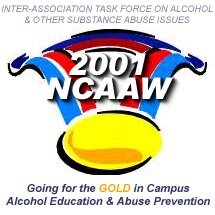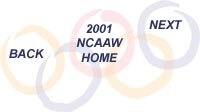|
This year the IATF is pleased to announce a new element as part of NCAAW and year-round prevention efforts. It is a perfect opportunity for you to engage the academic departments and classes that focus on journalism or creative writing. This contest can get students involved in the classroom by writing op-ed pieces examining high risk drinking. As the person or group responsible for planning NCAAW, you can play a vital role in distributing information about the contest on your campus.
Besides enlisting some faculty to support the contest, you might also want to host a campus-wide open entry contest for op-ed pieces following the same criteria listed below for the national contest. You could screen out your own winning entries and post them in your campus newspaper, or on your web site. Here is a basic overview of the national contest.
TOPIC:
How would you define high risk drinking in your campus community and what approaches would you recommend to best address this issue?
AWARDS:
The awards are made to individual students, not the college or university. Each prize will be awarded to the writers who best express their viewpoints on the topic of high risk drinking. There will be 1 First Prize of $2,000, and 4 Second Prizes of $1,000 each. Each submission should be created in op-ed format. An op-ed essay is an opinion or editorial type commentary on a specific topic. The American Heritage Dictionary defines op-ed as a newspaper page, usually opposite the editorial page, that features articles expressing personal viewpoints. An op-ed essay expresses more personal views that will promote dialogue, debate, and perhaps, solutions.
- All entries must be in the form of an op-ed essay. No research or term papers should be submitted.
- The op-ed may be developed from any point of view of the issue, a personal experience, an analysis, or an opinion.
- The student is encouraged to raise questions, single out issues, identify dilemmas, and offer suggestions for change.
- The op-ed must be the original, unpublished work of the student.
- The op-ed must be 500-700 words, not including footnotes.
- No name or identifying references may appear on the title page or in the manuscript, since the contest is to be judged anonymously (a numerical code will be put on your essay)
ENTRY GUIDELINES & ELIGIBILITY:
- Full-time undergraduate student at the time of application.
- Registered during the fall semester of 2001 at an accredited four- or two-year college or university.
SUBMISSION OF MATERIALS:
- Submit three (3) copies of your op-ed (one copy paper-clipped and two stapled).
- Submit a completed Student Entry Form that can be obtained on the website www.iatf.org
- Include a letter on school stationery from the Registrars Office, verifying your eligibility.
- In order to be considered for the prizes, you must also verify that you have followed the statement of academic honesty that appears on the Student Entry Form.
- Only one op-ed per student per contest year may be submitted.
- Keep a copy of your op-ed since no materials will be returned.
- Entries must be postmarked on or before Friday, November 2, 2001.
- Entries may not be faxed or e-mailed.
- Deadline:
Friday, November 2, 2001. Winners will be notified in January 2002.
Please complete the submission checklist and the Student Entry Form on the web site and send ALL materials together to:
Max V. Vest
Director of Student Activities
Tyler Haynes Commons
University of Richmond, Virginia 23173
Phone (804) 289-8505
Rights of Publication:
The Inter-Association Task Force reserves the right to publish the winning essays, in whole or in part. These essays may not be published elsewhere without written permission from the Task Force.
|
|


